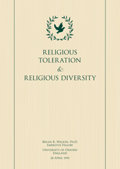World-affirming religions encounter intolerance even though they tend, by and large, to endorse enlightened secular values. Notwithstanding their generally positive orientation to the world, they may also have a mission to promote social reform, particularly in those departments of life such as healthcare, education, and religious liberty, which are the focus of their own distinctive values. The crucial point of the opposition which they encounter is that this kind of religion is presented as in itself a means of realizing benefits of the kind which are associated with everyday success, in health, competence, working efficiency, applied intelligence, and probably even in wealth—in general, a better experience of life in the world. For traditionalists such things are regarded as too mundane to be the proper concerns of religion—hence the charge that movements of this type are “not religions at all”. These religions generally discard the traditional and emotional aspects of mainstream Christianity. They are characterized by a more systematic and rational approach to the spiritual and see continuity between spiritual knowledge and everyday betterment of personal circumstances. Of course, as different religions, they employ different techniques by which to release spiritual energies, and explain their successes in different terms and with reference to their own body of doctrine. But sociologically, and certainly from the perspective of religious freedom and human rights, these religions offer people a distinctive interpretation of life and spirit. They commonly claim a pragmatic sanction in offering a method of attaining higher spiritual states the effect of which are manifested in practical everyday psychic and material benefits. Some of the early examples of world-affirming religion used a Christian overview in terms of which to propound their orientation—Christian Science and various New Thought bodies, such as Unity, and Divine Science, are examples. More recent religions that we may count as world-affirming are not derived from the Christian tradition. Among such might be included Scientology, whilst in other cases a world-affirming orientation has been derived from oriental religion, as in the case of Soka Gakkai (Nichiren Buddhism) and Transcendental Meditation of the Maharishi.
XXVIII. World-Affirmation in New Religions

Scientology, Social Science and the Definition of Religion
by James A. Beckford, Professor of Sociology, University of Warwick, England

Social Change and New Religious Movements
by Bryan R. Wilson,
Emeritus Fellow in Sociology, Oxford University

The Church of Scientology
by Juha Pentikäinen, Marja Pentikäinen, University of Helsinki, Finland

The Relationship Between Scientology and Other Religions
by Fumio Sawada, Eighth holder of the secrets of Yu-itsu Shinto, the oldest religion in Japan; President, Ahlul-Bait Center

The Religious Nature of Scientology
by Geoffrey Parrinder, Methodist minister, Professor, Comparative Study of Religions, University of London

Religious Philosophy, Religion and Church
by G.C. Oosthuizen, Professor of Science of Religion, University of Durban-Westville, Natal, South Africa

Scientology a New Religion
by M. Darrol Bryant, Department of Religious Studies, Renison College, University of Waterloo, Ontario, Canada

Apostates and New Religious Movements
by Bryan R. Wilson,
Emeritus Fellow in Sociology, Oxford University

Scientology: An Analysis and Comparison of its Religious Systems and Doctrines
by Bryan R. Wilson,
Emeritus Fellow in Sociology, Oxford University

The Reliability of Apostate Testimony About New Religious Movements
by Lonnie D. Kliever Ph.D., Professor of Religious Studies

The Sea Organization and its Role Within the Church of Scientology
by Frank K. Flinn Ph.D. Adjunct Professor in Religious Studies

Brief Analyses of the Religious Nature of Scientology
by J. Gordon Melton, Baylor University, Samuel Hill, Gary Bouma, Irving Hexham

Congregational Services of the Church of Scientology
by Bryan R. Wilson,
Emeritus Fellow in Sociology, Oxford University

Is Scientology A Religion?
by Alan W. Black, Associate Professor of Sociology, University of New England, Armidale, New South Wales, Australia

Is Scientology a Religion?
by Dean M. Kelley, National Council of Churches

Religious Toleration & Religious Diversity
by Bryan R. Wilson,
Emeritus Fellow in Sociology, Oxford University

Scientology A Religion In South Africa
by David Chidester, Professor of Comparative Religion, University of Cape Town, South Africa

Scientology: A True Religion
by Urbano Alonso Galan, Professor of Philosophy and Theology, Gregorian University of Rome

Scientology: A Way of Spiritual Self-Identification
by Michael Sivertsev, Moscow Academy of Sciences

Scientology: A Worshipping Community
by Lonnie D. Kliever, Southern Methodist University, Dallas, Texas

Scientology and Contemporary Definitions of Religion in the Social Sciences
by Alejandro Frigerio, Professor of Sociology, Catholic University of Argentina, Buenos Aires

Scientology and Islam an Analogous Study
by Fumio Sawada, Eighth holder of the secrets of Yu-itsu Shinto, the oldest religion in Japan; President, Ahlul-Bait Center

Scientology and Religion
by Christiaan Vonck, Rector, Faculty for Comparative Study of Religion, Antwerp, Belgium

Scientology: A Comparison with Religions of the East and West
by Per-Arne Berglie, Professor of History of Religion, University of Stockholm

Scientology Its Cosmology, Anthropology, System of Ethics and Methodologies
by Régis Dericquebourg, Professor of Sociology of Religion, University of Lille III, France

Scientology – Its Historical-Morphological Frame
by Dario Sabbatucci, Professor of History of Religions, University of Rome

Scientology: Its True Nature
by Harri Heino, Professor of Theology, University of Tampere, Finland

Scientology: The Marks of Religion
by Frank K. Flinn, Adjunct Professor of Religious Studies Washington University

